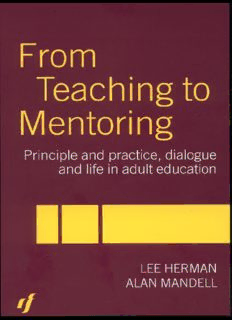Table Of ContentFrom Teaching to Mentoring
From Teaching to Mentoringargues for a simple educational idea: people,
particularly adult students, learn well when they are full collaborators in
deciding what, how and why they learn.
The authors advocate a sound, comprehensive, and lifelong education,
shifting the emphasis of the learning process to students’ understandings
of their personal, professional, and academic needs. Whilst heeding tradi-
tional criteria of educational excellence, they ask for profound educational
and political transformations, such as:
• teachers to become collaborative inquirers with their students;
• students to become skilled and lifelong independent learners;
• academic institutions to become learning communities embracing the
full diversity of human curiosity and experience.
The book discusses what mentoring is, and why it is now so much in
demand. Drawing upon two decades of extensive research and practice,
and using a variety of illuminating case studies, the authors offer a stimu-
lating and thorough examination of mentoring, integrating theory and
practice throughout. It will be invaluable to anyone involved in the teach-
ing of adults in further and higher education, as well as university adminis-
trators, programme directors, and development and training officers.
Lee Herman and Alan Mandell are Professors and Mentors at Empire
State College/The State University of New York. Dr Herman was co-
founder of the Empire State College Mentoring Institute, which Dr
Mandell currently directs.
From Teaching to Mentoring
Principle and practice, dialogue and life
in adult education
Lee Herman
Alan Mandell
First published 2004
by RoutledgeFalmer
11 New Fetter Lane, London EC4P 4EE
Simultaneously published in the USA and Canada
by RoutledgeFalmer
29 West 35th Street, New York, NY 10001
This edition published in the Taylor & Francis e-Library, 2008.
“To purchase your own copy of this or any of Taylor & Francis or Routledge’s
collection of thousands of eBooks please go to www.eBookstore.tandf.co.uk.”
RoutledgeFalmer is an imprint of the Taylor & Francis Group
© 2004 Lee Herman and Alan Mandell
All rights reserved. No part of this book may be reprinted or
reproduced or utilized in any form or by any electronic,
mechanical, or other means, now known or hereafter invented,
including photocopying and recording, or in any information
storage or retrieval system, without permission in writing from
the publishers.
British Library Cataloguing in Publication Data
A catalogue record for this b ook is available from the British
Library
Library of Congress Cataloging in Publication Data
Herman, Lee, 1950–
From teaching to mentoring : principle and practice, dialogue
and life in adult education / Lee Herman and Alan Mandell.
p. cm.
1. Mentoring in education. 2. Adult learning. I. Mandell, Alan,
1950– II. Title.
LC5225.M45H47 2004
374—dc21
2003013095
ISBN 0-203-46443-5 Master e-book ISBN
ISBN 0-415-26617-3 (Hbk)
ISBN 0-415-26618-1 (Pbk)
For A.G.
For Seymour and Florence Mandell, for Jonah Mandell
and for Victoria Shick
Contents
Acknowledgments viii
1 What is mentoring? 1
2 The principles of mentoring and the philosophy of
dialogue 16
3 Asking questions 44
4 Waiting as learning 70
5 Curriculum as collaborative planning and learning 93
6 The personal and the academic: dialogue as cognitive
love 117
7 The mentor as learner: habits of work 140
8 Authenticity and artifice: mentoring in virtual reality 168
9 Access to and within the academy 188
Epilogue: from teaching to mentoring 216
Bibliography 222
Index 227
Acknowledgments
Extracts from Hamilton, E. and Cairns, H., Plato: Collected Dialogues.
Copyright © 1961 by Bollingen Foundation reprinted by permission of
Princeton University Press.
With thanks to Random House for permission to quote from Nobody’s
Foolby Richard Russo.
Every effort has been made to contact the holders of copyright; in the
event of any inadvertent omissions, please inform the publisher.
Chapter 1
What is mentoring?
Where do you come from, Phaedrus my friend, and where are you
going?
Plato, Phaedrus(227a)
“What do you want to learn?”
“Why do you want to learn these things?”
“How do you want to learn them?”
“What do you believe you have already learned?”
“How do you decide that you have done so?”
We ask our readers to consider that these five questions can germinate
and shape an entire education. We suggest that the dialogues initiated and
sustained by these questions will sufficiently provide both the content and
process of learning in academic, workplace, community, and personal life.
Moreover, these questions, when asked of oneself in self-reflection, create
a lifelong course of learning which is at once entirely coherent and mean-
ingful and yet entirely open to endlessly diverse and unexpected discover-
ies. The name we apply to the people whose vocation it is to ask such
questions is “mentor.” The deliberate practice of learning, through asking
them of one’s students and of oneself, is “mentoring.”
We work in an academic setting, a degree-granting, public university.
We are professors who work mainly with adult students. They are busy and
pre-occupied with the responsibilities and commitments of adults to their
jobs and careers, to their families and their communities. They usually want
university degrees to serve their success and prosperity. They want their
academic learning to be efficient and convenient: that is, to move quickly
but also to flexibly accommodate the other demands on their time and
attention. Adult students want their learning to make them more powerful
in the world beyond the academy. And, once they are assured that the
content and organization of their learning will suit these practical needs,
our students also want to address the more contemplative issues
which almost invariably underlie, suffuse, and trouble the daily business
Description:What is mentoring? What makes a teacher a mentor?From Teaching to Mentoring is an argument for the power, practicality and the basic good of a simple educational idea. The authors advocate a sound, comprehensive and lifelong education, shifting the emphasis of the learning process to the needs of th

